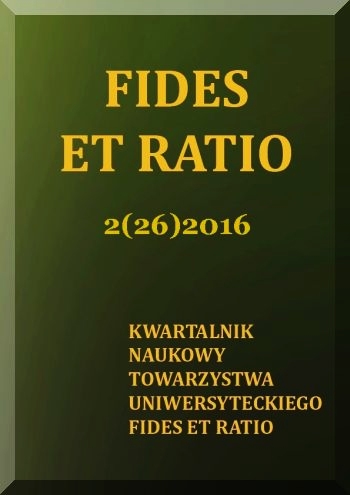Abstract
The aim of this paper is to present the relationship between relations in the family of origin and forgiveness, both in the very family and in relationships established in adulthood. Forgiveness has been reported to be a significant component of satisfactory and lasting relationships, especially in a family and in close relationships; what is more, forgiveness is additionally important for functioning of the person. Studied population was composed of young adults (N=103). Obtained results show that higher cohesion of family relationships and satisfaction with family life, as well as effective communication within a family and low level of chaos are conducive to forgiveness in a family. Low level of enmeshment is, on the other hand, the most important for forgiveness in relationships established in adulthood.
References
Boszormenyi-Nagy I., Krasner B. (1986). Between give and take: A clinical guide to contextual therapy. New York: Brunner/Mazel.
Carlisle R.D., Tsangi J-A., Ahmad N.Y., Worthington E.L , Witvliet, C.V.O., Wade, N. (2012). Do actions speak louder than words? Differential effects of restitution and apology on behavioral and self-reported forgiveness. The Journal of Positive Psychology, 7(4), s. 294-305.
Enright R.D., i the Human Development Study Group (1991). The moral development of forgiveness. W: W. Kurtines, J. Gewirtz (red.), Handbook of moral behavior and development, (123-152), Hillsdale, NJ: Erlbaum.
Fincham F. D., Beach S. R. H., Davila J. (2004). Forgiveness and conflict resolution in marriage. Journal of Family Psychology, 18 (1), s. 78.
Fincham F.D., Paleari F. G., Regalia C. (2002). Forgiveness in marriage: The roles of relationship quality, attributions and emotions. Personal Relationships, 9, s. 27-37.
Goldenberg H., Goldenberg I. (2006). Terapia rodzin. Kraków: Wydawnictwo Uniwersytetu Jagiellońskiego.
Gordon K., Baucom D.H., Snyder D. (2005), Forgiveness in Couple: Divorce, Infidelity, and Couples Therapy, (W:) E. L. Worthington (red.), Handbook of Forgivingness, (s. 407-421). miejsce
Hargrave T.D. (1994). Families and forgiveness: a theoretical and therapeutic framework. The Family Journal, 2(4), s. 339-348.
Hargrave T.D., Sells J.N. (1997). The development of a forgiveness scale. Journal of Marital and Family Therapy, 23, s. 41–63.
Kaleta K., Mróz J. (2013). Struktura relacji w rodzinie pochodzenia a poczucie wsparcia i osamotnienia. Społeczeństwo i rodzina, 35(2), s. 87-104.
Katz S.H. (2002). Healing the, father-son relationship: A qualitative inquiry into adult reconciliation. Journal of Humanistic Psychology, 42(3), s. 13-52.
Lee Y., Enright R. (2009). Fathers' Forgiveness as a Moderator Between Perceived Unfair Treatment by a Family of Origin Member and Anger With own Children. The family Journal: Counseling and Therapy for Couples and Families, 17(1), s. 22-31.
McCullough M.E., Pargament K.I., Thoresen C.E. (2000). The Psychology of Forgiveness: History, Conceptual Issues, and Overview. M. E. McCullough, K.I. Pargament, C. E. Thoresen (red.), Forgiveness: Theory, research, and practice, (s. 1-16). New York: Guilford.
Maio G.R., Thomas G., Fincham F.D., Carnelley K.B. (2008). Unraveling the Role of Forgiveness in Family Relationships. Journal of Personality and Social Psychology, 94(2), s. 307-319.
Margasiński A. (2009). Skale Oceny Rodziny. Polska adaptacja FACES IV Davida Olsona. Podręcznik. Warszawa: Pracownia Testów Psychologicznych.
Margasiński A. (2015). Teoria i wybrane modele systemów rodzinnych. W: A. Mar-gasiński (red.) Rodzina w ujęciu systemowym, teoria i badania, (s. 6-32), Warszawa, Pracownia Testów Psychologicznych PTP.
Olson D.H., Gorall D.M. (2003). Circumplex model of marital and family systems. W: F. Walsh (red.), Normal family processes, (s. 514 – 547), New York, Guilford.
Paleari F.G., Regalia C., Fincham F.D., (2005). Marital quality, forgiveness, empathy, and rumination: A longitudinal analysis. Personality and Social Psychology Bulletin, 31, s. 373-374.
Paleari F.G., Regalia C., Fincham F.D. (2003). Adolescents’ willingness to forgive their parents: An empirical model. Parenting: Science and Practice, 3, s.155-174.
Passmore N.L., Rea V.C., Fogarty B. T., Zelakiewicz P.M.L. (2009). Parental bonding and religiosity as predictors of dispositional forgiveness. W: 44th Australian Psychological Society Annual Conference, 30 Sept - 4 Oct 2009, Darwin, Australia. Accessed from USQ ePrints http://eprints.usq.edu.au
Pollard M.W., Anderson R.A., Anderson W.T., Jennings G. (1998). The development of family forgiveness scale. Journal of Family Therapy, 20(1), s. 95–109.
Scherer M., Worthington E.L., Hook J.N., Campana K.L., West S. L., Gartner A.L. (2011). Forgiveness and Cohesion in Familial Perceptions of Alcohol Misuse. Journal of Counseling & Development, 90, s. 160 – 168.
Worthington E.L., Scherer M. (2004). Forgiveness as an emotion-focused coping strategy that can reduce health risks and promote health resilience: Theory, review, and hypotheses. Psychology and Health, 19, s. 385–405.
Younger J.W., Piferi R.L., Jobe R.L., Lawler K.A. (2004). Dimensions of forgiveness: The views of laypersons. Journal of Social and Personal Relationships, 21(6), s. 837–855.
